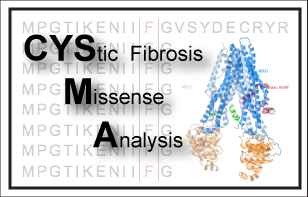If you are dealing with the genetics of cystic fibrosis or CFTR-related disorders, you may find this website useful. CYSMA has been developed as a tool to help you to predict the impact of novel uncharacterized missense variants when the information provided by CFTR patient databases such as CFTR-France, CFTR1 and CFTR2 remain insufficient.
So far, molecular diagnosis of cystic fibrosis and CFTR-related disorders had led, worldwide, to the identification of more than 2000 variations in the CFTR gene, with a majority of rare variations. The CFTR-France database, developed in our laboratory, is dedicated to the annotations of rare CFTR variants. Up to now, we collected 844 different variants but more than 47% have been reported only once, including a large proportion of missense variants. Their interpretation is hampered by the lack of available data and reliable resources, making patient care and genetic counseling challenging.
As a consequence, like in most laboratories, we frequently use in silico prediction tools, such as SIFT,
Align GVGD,
MAPP,
PolyPhen, to predict the impact of new missense variants.
These pathogenicity prediction programs are fairly powerful. However, as they vary in their algorithms, their results can be significantly different for a given variant.
Moreover, as those tools tend to have low specificity, at the end you don't know how to interpret the variant, mainly because you don't know why the software considers your variant as pathogenic (or not).
To this end, we developed CYSMA (CYStic Fibrosis Missense Analysis), a website with integrated in-house bioinformatics tools to assist geneticists and researchers to assess the pathological relevance of rare CFTR missense variants. The interpretation of a particular variant can be challenging, especially with variant with milder effect, so the phylosophy of the project is different from the usual predictors.
Indeed, CYSMA will perform fastidious calculations, and will provide you with a collection of information, ranging from sequence conservation to structural observations, to assist you to decipher whether your variant can be considered as pathogenic or not.
Considering all this, CYSMA is not designed for high-throughput analyses, so no batch mode is provided in this website.
Please also note that CYSMA does not consider splicing alterations so find below some links that can be useful to test the effect of your variant on splicing.

